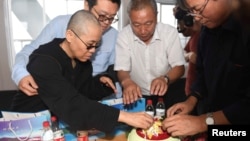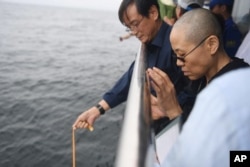The ashes of Chinese dissident and Nobel Peace laureate Liu Xiaobo were scattered at sea Saturday after a muted cremation ceremony that was under government watch in the Chinese city of Shenyang.
Liu, who was often called China's best-known human rights prisoner, died Thursday at age 61 following a high-profile battle with liver cancer that made his death as controversial as his life.
He spent his last eight years as a prisoner of conscience and died at a hospital in Shenyang, where he had been moved from his prison cell in the final stage of his illness. The judicial bureau in Shenyang announced the cause of death as "multiple organ failure."
Officials showed reporters a slide show of photographs of the ceremony that was attended by his wife, Liu Xia, Liu's two brothers and a brother of Liu's wife. The government said Liu's friends also attended the funeral. Of the estimated 10 people in attendance, close friends of the couple did not appear to be among them in the government images.
One picture showed Liu's widow wearing dark sunglasses and clutching a photograph of her late husband. Just hours after the ceremony, a government video showed Liu Xia and others lowering an urn into the water, depriving family and supporters of a physical location to pay their respects to China's only Nobel Peace Prize laureate.
Shenyang municipal government official Zhang Qingyang said Liu's body was cremated "in accordance with the will of his family members and local customs."
Liu's older brother, Liu Xiaoguang, thanked the Communist Party for its "humanistic care" of his late brother at a news conference orchestrated by Shenyang municipal officials.
Beijing blamed for ‘heavy responsibility’ in Liu's death
The leader of the Norwegian Nobel committee said earlier this week the Chinese government bore a "heavy responsibility" Liu's his death. "We find it deeply disturbing that Liu Xiaobo was not transferred to a facility where he could receive adequate medical treatment before he became terminally ill," said Berit Reiss-Andersen. "The Chinese government bears a heavy responsibility for his premature death," she said in an emailed statement.
China has lodged complaints against Germany, France, the U.S. and the United Nations human rights high commissioner over criticism about the handling of Liu's death.
Foreign Ministry spokesman Geng Shuang blasted "certain countries" for interfering in China's "judicial sovereignty."
"China is a country under the rule of law. The handling of Liu Xiaobo's case belongs to China's internal affairs, and foreign countries are in no position to make improper remarks," Geng said.
The ruling Communist Party newspaper said Liu lived a "tragic life." The Global Times said, "Lui's last days were politicized by the forces overseas. They used Liu's illness as a tool to boost their image and demonize China."
U.S. Secretary of State Rex Tillerson has called for China to release Liu's widow from house arrest. "I call on the Chinese government to release Liu Xia from house arrest and allow her to depart China, according to her wishes."
"Even as Liu Xiaobo's illness worsened, the Chinese government continued to isolate him and his family, and denied him freely choosing his medical treatment," said Sophie Richardson, China Director of Human Rights Watch. "The Chinese government's arrogance, cruelty, and callousness are shocking - but Liu's struggle for a rights-respecting Democratic China will live on."















